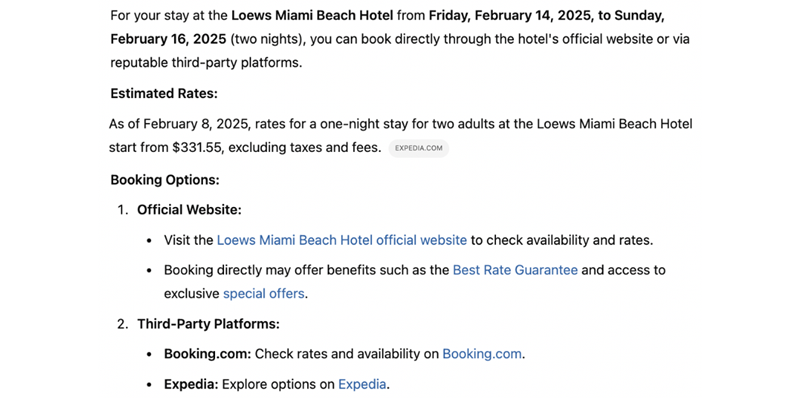No AI (Artificial Intelligence) powered hospitality distribution models offer live pricing for hotels. So far, these platforms only display estimated prices.
NB: This is an article from mirai, one of our Expert Partners
Subscribe to our weekly newsletter and stay up to date
Needless to say this is a huge weakness when it comes to driving actual bookings and explains why AI hasn’t been a big gamechanger yet.

But this will change in 2025 and it is certainly just a question of time.
This is where access to real-time ‘ARI’ -availability, rates and inventory- comes into play, representing the next frontier in AI-powered hospitality distribution. Can you imagine when AI returns final exact prices? Something like the following simulation:

Travel tech companies (mostly OTAs, PMSs, channel managers and major booking engines) offer their own APIs to access real-time availability, rates and inventory (ARI). Existing metasearch players, such as Google Hotels and Tripadvisor, use these APIs and redirect customers to the different sites (hotel websites and OTAs). However, maintenance and scalability have been a big issue. Will AI platforms follow and implement these APIs or try a new approach?
Model-control Protocol or MCP, the catalyst between AI and real-time ARI?
MCP offers a standardized and scalable framework for enabling large language models or LLMs to access diverse data sources and tools in a scalable manner.
This advancement allows AI-based platforms such as ChatGPT, Gemini and Perplexity to integrate real-time data from hotel technology providers, including property management systems (PMS), channel managers, revenue management systems (RMS) and booking engines.
As a result, these platforms can extend their role beyond destination and hotel discovery, offering real-time availability, pricing and potentially even end-to-end booking capabilities, without users needing to leave the AI interface.
In theory, transactional functionality could also be embedded, enabling direct bookings through AI agents. This is certainly a potential scenario. However, it’s uncertain whether this aligns with the preferences of both consumers and hospitality providers. Similar initiatives, such as Google’s “Book on Google” and Tripadvisor’s “Instant Booking”, faced adoption challenges and were ultimately discontinued or set aside. In addition to market appetite, several critical barriers remain, including data security, payment integration, user privacy and brand loyalty.
Finally, although MCP presents an attractive and promising vision, it remains an early-stage concept. Adoption is still limited and highly dependent on organizational scale, technical readiness and strategic alignment.





